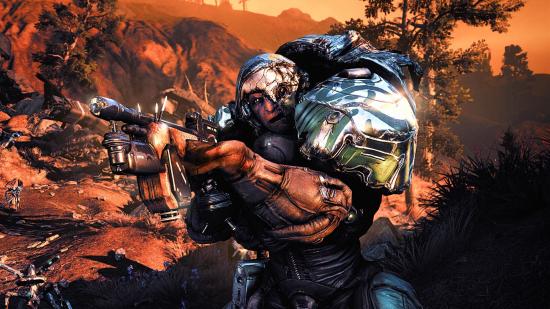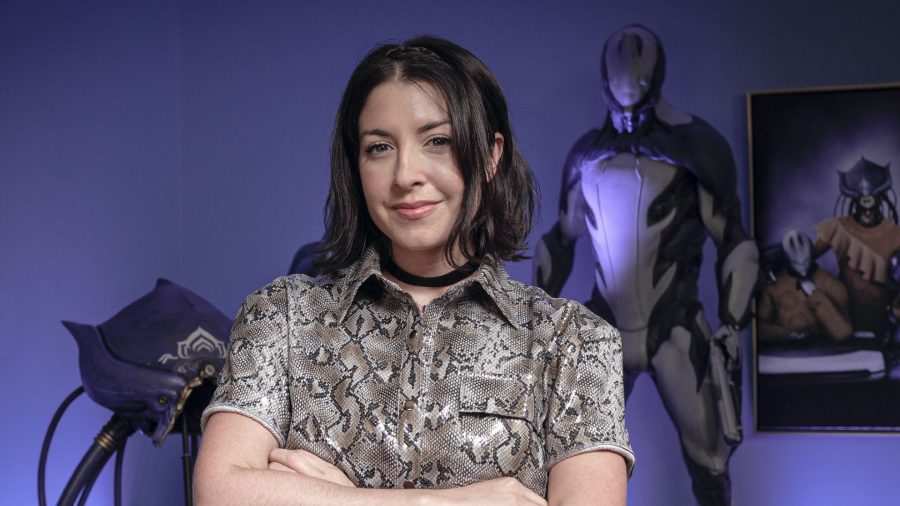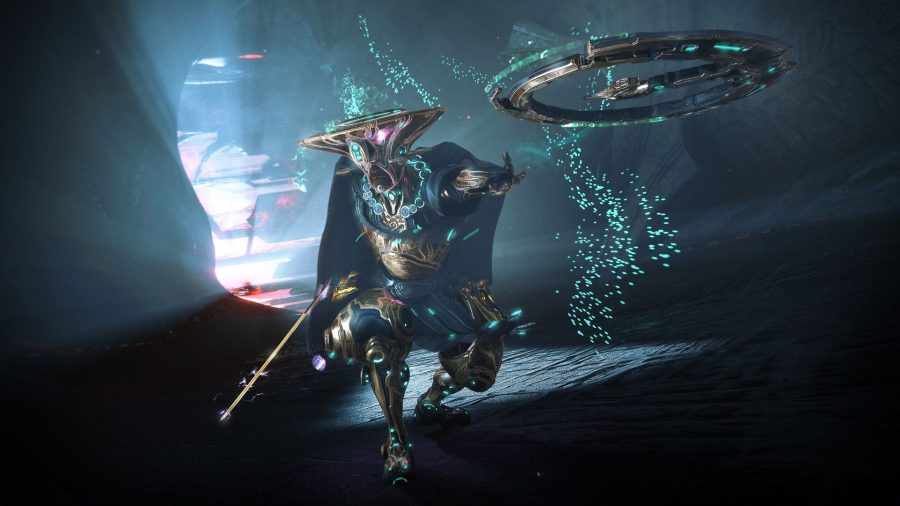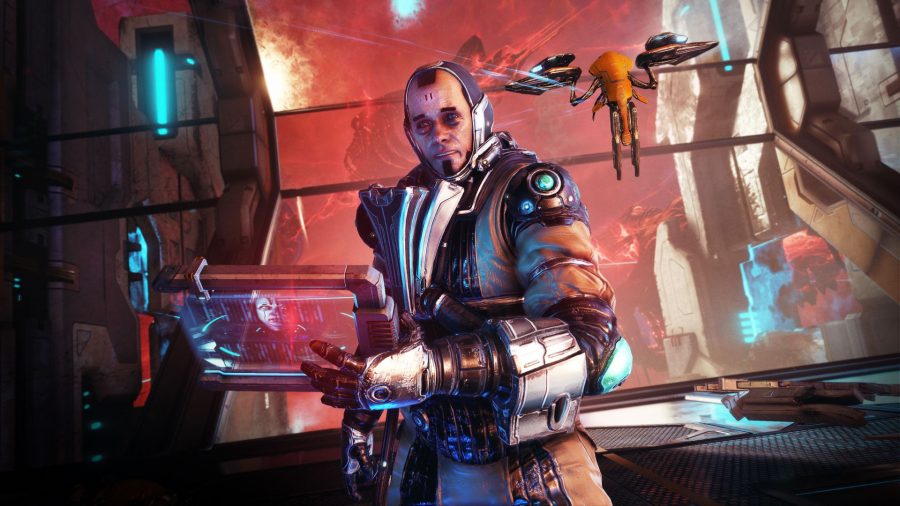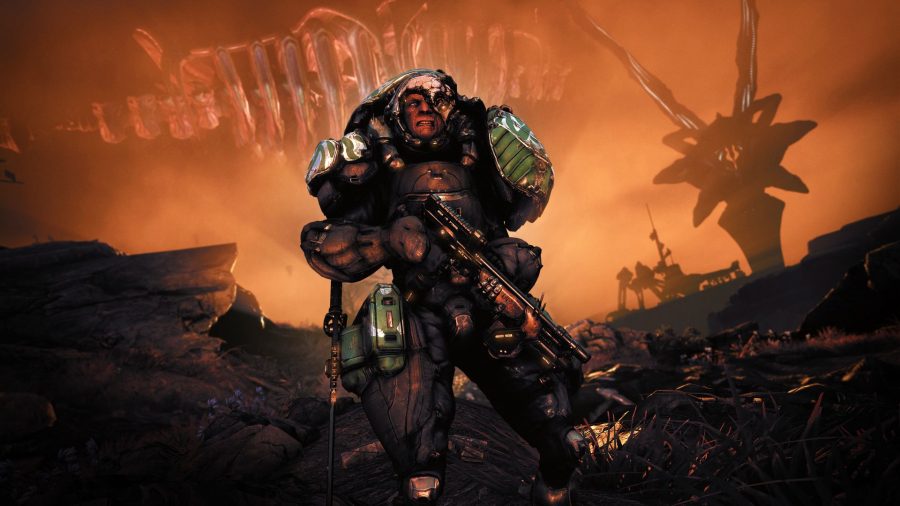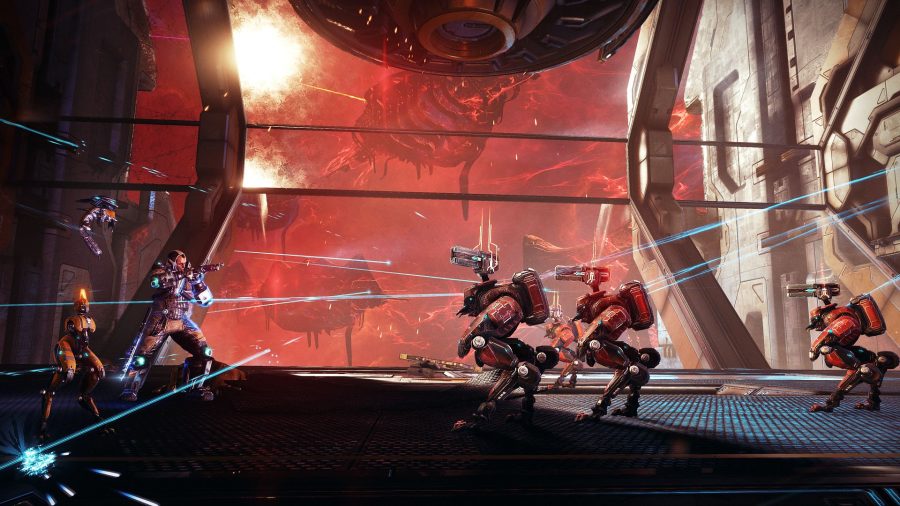The last several years have seen space-action MMO Warframe grow in ways that have frequently been astonishing. Since 2017, Canadian developer Digital Extremes has expanded Warframe with huge open-world zones, added ship-to-ship space combat with Railjacks, and even created zombified mechs for players to pilot into battle. The New War expansion promises to tie all of this together in the largest narrative update so far, setting Warframe up for a new era – and it’s been heavily shaped by almost two years of pandemic lockdowns and isolation.
Rebecca Ford is one of the most recognisable faces of Warframe. Ford is the director of community and live operations at Digital Extremes, and she hosts the studio’s regular developer streams, keeping the community updated on what’s on the way for Warframe. In-game, however, she’s the ever-present voice of the Lotus, the player’s mysterious guide. Ford has now worked on Warframe for nine years, and says the New War is the proudest she’s ever been of something the studio has made.
“I find myself looking at the depth of this quest, emotionally, creatively, collaboratively,” Ford tells us. “The team has never been bigger, the team has never been through more hardships, in terms of COVID-19 and working from home, and yet somehow, throughout it all, the New War has come together. And it’s taken so much inspiration from the team itself, so for me to look at it in its current state and see what we’re doing, I am just so proud.”
While Warframe has continued to expand over the past few years, Ford says the central story – the player’s own story – hasn’t seen much forward progress since the Sacrifice quest in 2018, in which the Lotus revealed her true form as a Sentient, the malevolent artificial race now poised to invade the Origin System.
“Warframe’s past three years have gone all-in on open-world and Railjack – those things have built the infrastructure for which New War reaps all benefits,” Ford explains.
Ford compares the past three years of expansion in Warframe to a “suburban sprawl,” with new neighbourhoods cropping up and finding their own identities. “Now the mayor’s in town, and that mayor is the New War, and all of these neighbourhoods and all of these aspects of the game are directly related to what the New War has to offer.”
That means there’s “no ambiguity about what matters” once the New War arrives. It’s also going to be an inflection point for players’ journey through Warframe’s narrative. There’s the time before the New War, and post-New War.
Ford uses the term “post-New War world” frequently while discussing the expansion, and while she’s cryptic about what this means specifically, it’s clear the events in the new cinematic quest are going to be pivotal. “We get to continue our game as a service quite deliberately based on what the New War did to you as a player,” she says.
That parallels roughly with how Digital Extremes has had to approach making the New War while working from home during the COVID-19 pandemic. The inability to work together in the London, Ontario studio has pushed the release of the New War back by a year, and Ford says she and the other developers have had to adjust to a lonelier way of life during that time.
“You have no one to look over at and make eye contact with, and just be like, yeah, this is cool – that’s not there, right? And those little human moments are kind of what I think keeps creative people safe from impostor syndrome, and any number of self-doubts. And they’re gone. You have to type out your self-doubt, which makes it even more real – because it’s like you took your self-doubt and turned it into a Slack message – you gave it life.”
Ford is keenly aware of how the pandemic has impacted the Warframe community, too, and she says the increased reliance on videogames in an uncertain world has given the team a troubling sense of responsibility.
“I think the reality of games as a coping platform, as well as an entertainment platform, hit a peak with the pandemic,” Ford says. “What do people do? Occupy their time with videogames. Knowing people are using something I work on to cope is a blessing and a bit of a burden – because it makes the stakes so much higher if we eff up.
“I don’t think I’ve made my peace with that yet. And if I have made my peace with it, then it hasn’t been in a particularly healthy way, because I really struggle with the pandemic myself.”
The additional time spent on the New War has also allowed Digital Extremes the chance to correct some of those past mistakes, Ford says, including the “unfortunate experience” of 2019’s Railjack launch.
“We kind of lost that understanding,” Ford says. “People didn’t understand how we could have released something like that at the time. Where was what we promised? We spent the better part of this year redoing Railjack from the ground up. It is an entirely new system.”
Some of those fits and starts have been borne out of the fact that there’s nothing else quite like Warframe out there. “I think we’re lucky to have the freedom to be able to course-correct some items that we’ve released,” Ford says. “Now that those things have happened, like that huge Railjack QoL pass, it makes me a lot more confident and optimistic for sure.”
“Creatively, you can never know how people are going to react to your work, but at the very least I know that this is an authentic experience, one that means so much to people,” Ford says. She pauses for a moment to search for the right words. “We’re not following a template. We’re doing our own thing because this is how we want to tell the story. No version of this is derived from some formula: it is the New War.”
The New War expansion for Warframe arrives on December 15.
